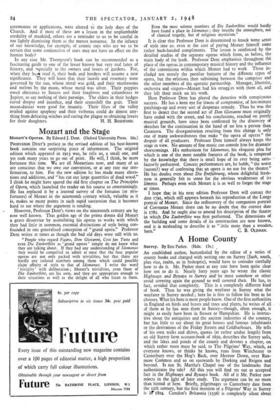Mozart and the Stage
Mozart's Operas. By Edward J. Dent. (Oxford University Press. 16s.) PROFESSOR DENT'S preface to the revised edition of his best-known book contains one surprising piece of information. The original edition which appeared in 1913 was, he tells us, a small one, and yet took many years to go out of print. He will, I think, be more fortunate this time. We are all Mozartians now, and many of us are conscious that we owe our conversion, or at any rate our con- firmation, to him. For the new edition he has made many altera- tions and additions, and " has cut out large quantities of dead wood." I think he might have spared the old first chapter on The Principles of Opera, which launched the reader on his course so entertainingly. He has replaced it by a learned survey of the fortunes (or mis- fortunes) of Mozart in the nineteenth century which, valuable as it is, makes so many points in such rapid succession that it becomes hard to see where the argument is tending.
However, Professor Dent's views on the nineteenth century are by now well known. That golden age of the prima donna did Mozart a grave disservice by assimilating his operas to works with which they had little in common, essential distinctions of style being con- founded in one generalised conception of " grand opera." Professor Dent writes at times as though the bad old days were still with us.
"People who regard Figaro, Don Giovanni, Cosi fan Tutte and even Die Zauberflote as `grand operas' simply do not know what they are talking about. If they had any understanding of Idomeneo they would be compelled to admit at once that the four popular operas are not only packed with trivialities, but that there are hardly any isolated numbers among them which could possibly claim affinity of style to that of Idomeneo. I write the word `triviality' with deliberation ; Mozart's trivialities, even those of Die Zauberflote, are his own, and they are appropriate enough to their situations as well as the delight of all who listen to them. Even the most solemn numbers of Die Zauberfiette would hardly have found a place in Idomeneo ; they breathe the atmosphere, not of classical tragedy, but of religious mysticism."
It is clear that Professor Dent is determined to knock some sense of style into us, even at the cost of paying Mozart himself some rather back-handed compliments. The lesson is reinforced by the detailed studies of the separate operas which form, as before, the main body of the book. Professor Dent emphasises throughout the place of the operas in contemporary musical history and the influence of the conventions within which Mozart had to work These in- cluded not merely the peculiar features of the different types of opera, but the.celations then subsisting between the composer and the other members of the operatic partnership. Manager, librettist, orchestra and singers—Mozart had his struggles with them all, and they left their mark on his work. Here Professor Dent has played the detective with conspicuous success. He has a keen eye for traces of compromise, of last-minute patchings-up and every sort of desperate remedy. Thus he was the first to detect that the second act of Don Giovanni must originally have ended with the sextet, and his conclusions, reached on purely musical grounds, have since been confirmed by the discovery of sketches for the continuation in the hand of no less a person than Casanova. The disorganisation resulting' from this change is only one of many awkwardnesses that make " the opera of operas " the despair of all producers. Professor Dent himself always keeps the stage in view. No amount of fine music can console him for dramatic shortcomings. His enthusiasm for Idomeneo, his eloquent plea for which is one of the most notable features of the book, is tempered by the knowledge that there is small hope of its ever being satis- factorily performed. Concert performances are, he holds, " the worst (surest?) way of confessing that an opera is no use for the theatre." He has doubts even about Die Entfuhrung, whose delightful fresh- ness is generally felt to atone for the obvious weaknesses of its libretto. Perhaps even with Mozart it is as well to forget- the stage at times.
I hope that in his next edition Professor Dent will correct the date 1791, which still appears beneath his reproduction of the Lange portrait of Mozart. Since the rediscovery of the companion portrait of Constanze Mozart there can be no doubt that the correct date is 1782. And he ought also to amend his description of the theatre in which Die Zauberflote was first performed. The dimensions of the building and some details of its construction are now known, and it is misleading to describe it as " Little more than a wooden.






































 Previous page
Previous page